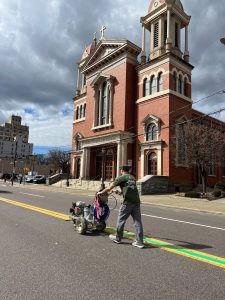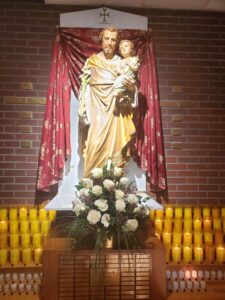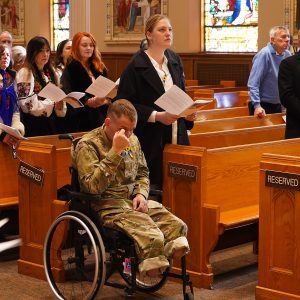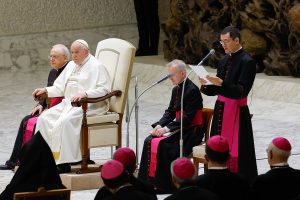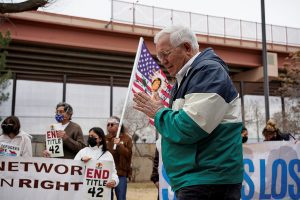(OSV News) – The tens of thousands of Catholics planning to attend the five-day 10th National Eucharistic Congress in Indianapolis in July will experience large-scale liturgies, dynamic speakers, and opportunities for quiet prayer and faith-sharing, with six different “impact session” tracks tailored to their peer groups or faith journey.
Leaders hope attendees become “a leaven for the church in the United States as Eucharistic missionaries going back to their parishes, but also sort of a gathering of people who are standing in the breach, or in proxy, for the entire church across the United States, inviting that new Pentecost, and that new sending (of) healing and life to the full,” said Tim Glemkowski, CEO of the National Eucharistic Congress Inc., in a January meeting with media.

The event is the pinnacle of the National Eucharistic Revival, a three-year initiative of the U.S. bishops to inspire a deeper love for Jesus in the Eucharist that began in 2022. The revival focused its first year on dioceses, the second and current year on parishes, and the final year, beginning after the congress, on “going out in mission.”
Catholic leaders have described the National Eucharistic Congress as potentially transformational for the Catholic Church in the U.S.
“I believe this event and the National Eucharistic Pilgrimage leading up to it will have a generational impact on our country,” wrote Bishop Andrew H. Cozzens of Crookston, Minnesota, and chairman of the board of the National Eucharistic Congress Inc., in a commentary published by OSV News in January.
The congress will be held at Lucas Oil Stadium, home of the Indianapolis Colts, and the adjacent Indianapolis Convention Center. The congress distinguishes itself from other Catholic conferences because it “invites the entire church to come to pray together for revival,” said Joel Stepanek, the National Eucharistic Congress’ vice president of programming and administration.
“We’re going to gather with those there to pray for the Holy Spirit to fall on us, to pray for revival in the church in the United States, to pray for healing in our own lives so we might be Eucharistic missionaries, and we’ll do that through powerful experiences of prayer and with the encouragement of a wonderful keynote speakers,” Stepanek said.
Registration is open for full-event and single-day passes at eucharisticcongress.org/register.
The congress’ theme is centered on Luke 24, which describes Jesus meeting two disciples on the road to Emmaus following his death and resurrection. The disciples did not recognize him at first but listened to him explain Scripture, only to later realize their companion was Jesus during their evening meal “in the breaking of the bread.” They raced back to Jerusalem to tell others what they had seen.
Day one, Wednesday, July 17, is themed “From the Four Corners.” The congress is scheduled to begin at 7 p.m. that day with an opening ceremony in Lucas Oil Stadium. The evening’s speakers include Bishop Cozzens; Cardinal Christophe Pierre, apostolic nuncio to the U.S.; and Sister Bethany Madonna, a Sister of Life who is the local superior and mission coordinator of the sisters’ Phoenix foundation.
Day two, Thursday, July 18, is themed: “The Greatest Love Story.” The morning schedule begins with 8:30 a.m. Mass, with options to worship in English or Spanish, including an additional Mass for youth.
Mass is followed by impact sessions, where attendees can choose from six options with “dynamic preaching and music tailored to their state in life and mission,” according to the congress’ website. Following lunch are breakout sessions and “special experiences” tailored for specific groups or interests.
The evening includes a three-hour “revival session” with Father Francis “Father Rocky” Hoffman, Relevant Radio’s CEO and executive director, leading a Family Rosary Across America live from Lucas Oil Stadium. Father Michael Schmitz, host of the popular podcast “The Bible in a Year,” also will speak.
Day three, Friday, July 19, is themed “Into Gethsemane.” Friday’s schedule mirrors Thursday’s, with morning Mass and impact sessions, afternoon breakout sessions and an evening revival session with the Family Rosary Across America’s keynote speaker Sister Josephine Garrett of the Sisters of the Holy Family of Nazareth.
Day four, Saturday, July 20, is themed “This is My Body.” Saturday’s morning and early afternoon schedule follows the order of the previous days. In the mid-afternoon, attendees will form a large Eucharistic procession in downtown Indianapolis, which Stepanek described as “a profoundly impactful experience.”
“A lot of folks who will be out on a Saturday afternoon in downtown Indianapolis will encounter the Lord and will receive the witness that we have, as a Catholic community, of prayer and joy in that city,” he said. “It’s really one of the biggest outward facing pieces of the congress itself.”
The evening includes a revival session featuring the Family Rosary Across America and speakers Bishop Robert E. Barron of Winona-Rochester, Minnesota; Mother Adela Galindo, founder of the Servants of the Pierced Hearts of Jesus and Mary religious order and lay Apostles of the Pierced Hearts; and Gloria Purvis, host of “The Gloria Purvis Podcast.” Musician Matt Maher will lead worship.
Day five, Sunday, July 21, is themed “To the Ends of the Earth.” The morning schedule begins with a revival session with speaker and author Chris Stefanick, founder and president of Real Life Catholic, followed by the revival’s closing liturgy celebrated by a papal delegate, with the Indianapolis Symphony Orchestra.
“This is our big commissioning as a Catholic community, where we will go forward then and take what we have been entrusted with as being part of this experience back to our homes, our communities, our schools, our parishes and our families to really be that salt and leaven in the world that is in need of the joy that we’re going to bring,” Stepanek said.
The congress’ main events will be emceed by Montse Alvarado, president and chief operating officer of EWTN News; Sister Miriam James Heidland of the Society of Our Lady of the Most Holy Trinity; and Father Josh Johnson, a speaker, author and priest of the Diocese of Baton Rouge, Louisiana. Dave Moore, co-founder of Catholic Music Initiative, will provide music throughout the congress.
The morning impact sessions planned for days 2-4 are organized into six tracks: Encounter, Encuentro, Empower, Renewal, Cultivate and Awaken.
Encounter is the group of general sessions held in Lucas Oil Stadium. With a focus on deepening a person’s relationship with Jesus in the Eucharist, it will feature speakers including Katie Prejean McGrady, Sister Mary Grace Langrell, Mary Healy, Edward Sri and Deacon Harold Burke-Sivers.
Encuentro sessions are in Spanish, with speakers including Bishop Daniel E. Flores of Brownsville, Texas; Archbishop Gustavo García-Siller of San Antonio; Andrés Arango; Mabel Suárez; Kathia Arango; and Dora Tobar.
Empower sessions are designed to be smaller and “more intimate,” with a focus on practical tools for becoming a “Eucharistic missionary” in one’s community. Speakers include Deacon Larry and Andi Oney, Father John Burns, Chika Anyanwu, Auxiliary Bishop Joseph A. Espaillat of New York, Meg Hunter-Kilmer and Paul Albert.
Renewal sessions are for people who work or volunteer in a parish, diocesan or other ministry role “to explore new and creative possibilities of accompaniment, evangelization, and catechesis,” according to the congress’ website. Speakers include Damon Owens, Sarah Kaczmarek, Julianne Stanz and Curtis Martin.
Cultivate sessions are focused on families to attend together, with speakers including Father Leo Patalinghug and Ennie and Cana Hickman. Awaken sessions are designed for high school youth, with large-group sessions in the mornings and smaller breakout sessions in afternoons. Speakers include Oscar Rivera, Brian Greenfield and Jackie Francois Angel. Teenagers attending the sessions must be part of a youth group or accompanied by a parent or guardian.
The congress also will include an exhibit hall and a display of a replica of the Shroud of Turin, art exhibits, opportunities for confession and adoration, and music performances.
Leading up to the congress is the National Eucharistic Pilgrimage, a two-month pilgrimage beginning at four different points of the U.S. where groups of pilgrims will primarily walk to Indianapolis with the Eucharist in a monstrance. The congress’ opening event will include pilgrims from the four routes converging for a procession into the stadium.
Glemkowski said the congress shares the goal of the revival: “the idea that we need a spiritual movement of God in our church to bring about renewal in this time.”
“The bishops have prophetically inaugurated or invited the church to this time of encounter with Jesus, a deepened encounter with Jesus in the Eucharist, which has everything to do with belief and relationship and what … (St.) John Henry Newman would call ‘real assent’ — a sacrificial gift of your heart to Jesus in the Eucharist which bears fruit for the life of the world.”
Large-scale Eucharistic congresses have been part of the fabric of devotion in the Catholic Church for nearly 150 years, and continue to be regularly convened by U.S. dioceses and in other countries. The 10th National Eucharistic Congress is the first Eucharistic congress in the U.S. 83 years, with the most recent national congress held in St. Paul, Minnesota, in 1941.
The first U.S. national Eucharistic congress was held in 1895 in Washington, and subsequent congresses have been hosted by St. Louis, New York, Pittsburgh, Cincinnati, Omaha, Cleveland and New Orleans.
The U.S. also hosted two International Eucharistic Congresses in 1926 in Chicago and 1976 in Philadelphia. The Philadelphia congress drew 1.5 million people, including pivotal Catholic figures such as St. Teresa of Kolkata, Dorothy Day and a future pope, St. John Paul II. Quito, Ecuador, is hosting the 53rd International Eucharistic Congress in September.


